- Buhari Extends Border Closure To 2020
President Muhammadu Buhari has extended the closure of the nation’s borders to January 31, 2020.
The development was disclosed in a memo sent to Nigeria’s border control officials, which dated November 1, 2019.
The Deputy Comptroller of Customs in charge of Enforcement, Investigation and Inspectorate, Victor Dimka, conveyed the Presidential directive in the memo to the Sector Coordinators.
“I am directed to inform you that it is observed that despite the overwhelming success of the operation, particularly the security and economic benefits to the nation, a few strategic objectives are you to be achieved.
“Against this background, Mr President has approved the extension of the exercise to January 31, 2020.
“Consequently, you are requested to convey the development to all personnel for their awareness and guidance.
“Meanwhile, allowance for personnel sustenance and fuelling of vehicles for the period of extension will be paid as soon as possible,” the memo reads.
The closure of the borders is to ensure Nigeria is no longer a ‘dumping ground’ for unwanted chemicals and spoilt products, among others, as well as promote local farmers/manufacturers.
The National Chairman of Nigeria’s ruling party, All Progressive Congress (APC), Adams Oshiomshole had earlier hinted that Nigeria’s borders would remain closed until neighbouring countries learn to respect the rule of fair trade.
“We must close the borders even if we do it for two, three years, it doesn’t matter. So that our neighbours will begin to respect the rules of international engagement and trade,” he had said.
The new development which has shown the Federal Government’s determination in promoting made-in-Nigeria good, has shattered the hope of neighbouring countries that have hopped the policy would be reversed soon, as it has been affecting their businesses.

 Forex3 weeks ago
Forex3 weeks ago


 Naira2 weeks ago
Naira2 weeks ago
 Billionaire Watch2 weeks ago
Billionaire Watch2 weeks ago






 Naira3 weeks ago
Naira3 weeks ago






 Naira2 weeks ago
Naira2 weeks ago


 Naira1 week ago
Naira1 week ago




 Naira4 weeks ago
Naira4 weeks ago






 Naira1 week ago
Naira1 week ago






















